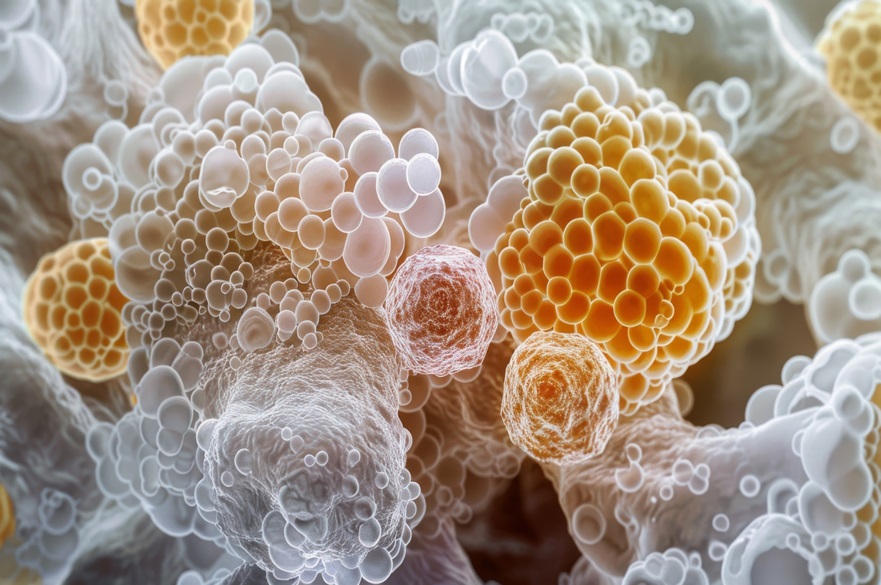Removing gene from fat tissue tricks body into burning more calories, study suggests
Removing a specific gene from fat tissue could fool the body into speeding up metabolism and burning more calories, a new study has found.
By Dave Rogers | Published on 16 September 2024
Categories: Press office; Research; School of Science and Technology;

It is hoped that the research, led by scientists at Nottingham Trent University and the University of Edinburgh, could help pave the way for protecting against the metabolic diseases that often come with obesity, such as type 2 diabetes.
The study focused on the gene ‘PHD2’ which is found at high levels in brown adipose tissue, a type of body fat that is activated in cold temperatures to help keep us warm.
Brown fat helps the body to burn calories, breaking down blood sugar and fat molecules to create heat and maintain body temperature.
The research was prompted by the idea that people often lose weight and have a faster metabolic rate in higher altitudes, where it is cooler and there is low oxygen.
As such the team focused their work on PHD2, which works as an oxygen sensor for the body and plays an important role in the regulation of brown fat.
By removing the gene in the brown fat of mice the researchers discovered that they were able to mimic the high altitude effect on fat and make the tissue believe it was ‘hypoxic’ – when lower levels of oxygen reach the tissue.
Importantly, the researchers were able to achieve this effect in a warm environment under conditions where brown fat is normally suppressed.
The study showed that, despite eating significantly more, the mice without the gene burned predominantly more fat and 60% more calories than mice with the gene.
The researchers also observed that signs of poor metabolic health typically associated with excess weight were not found in mice without the gene.
As part of the study the team also analysed blood from more than 5,000 participants, revealing that levels of the PHD2 protein were higher in those who carried more fat around their stomach and that the gene was associated with an increased risk of metabolic disease.
The team argues that inhibiting the oxygen sensing gene could help protect the body from type 2 diabetes and other metabolic disorders.
“Brown fat is a special kind of calorie burning tissue more active in humans when they are exposed to cold temperatures,” said lead author Dr Zoi Michailidou, a researcher in Nottingham Trent University’s School of Science and Technology.
She said: “By removing a protein that lets fat cells sense oxygen, we have been able to show that calorie burning could happen in mice and human cells even when they are not exposed to cold temperatures.
“Reducing this protein’s effect may break the link between being overweight and type 2 diabetes, meaning our findings could be important for people with an increased risk of this disease.
“Although it is early days and more research is required in people, targeting this key protein could open up new strategies to sustain weight loss by increasing metabolism and without the need for continuous dieting.”
The study is published in the journal Nature Communications.
Notes for Editors
Press enquiries please contact Dave Rogers, Public Relations Manager, on telephone +44 (0)115 848 8782, or via email.
Nottingham Trent University (NTU) received the Queen’s Anniversary Prize for Higher and Further Education in 2021 for cultural heritage science research. It is the second time that NTU has been bestowed the honour of receiving a Queen’s Anniversary Prize for its research, the first being in 2015 for leading-edge research on the safety and security of global citizens.
The Research Excellence Framework (2021) classed 83% of NTU’s research activity as either world-leading or internationally excellent. 86% of NTU’s research impact was assessed to be either world-leading or internationally excellent.
NTU was awarded The Times and The Sunday Times Modern University of the Year 2023 and ranked University of the Year in the Whatuni Student Choice Awards 2023. It was awarded Outstanding Support for Students 2020 (Times Higher Education Awards), University of the Year 2019 (Guardian University Awards, UK Social Mobility Awards), Modern University of the Year 2018 (Times and Sunday Times Good University Guide) and University of the Year 2017 (Times Higher Education Awards).
NTU is the 5th largest UK institution by student numbers, with approximately 40,000 students and more than 4,400 staff located across five campuses. It has an international student population of 7,000 and an NTU community representing over 160 countries.
Since 2000, NTU has invested £570 million in tools, technology, buildings and facilities.
NTU is in the UK’s top 10 for number of applications and ranked first for accepted offers (2021 UCAS UG acceptance data). It is also among the UK’s top five recruiters of students from disadvantaged backgrounds and was the first UK university to sign the Social Mobility Pledge.
NTU is ranked the second most sustainable university in the world in the 2022 UI Green Metric University World Rankings (out of more than 900 participating universities).